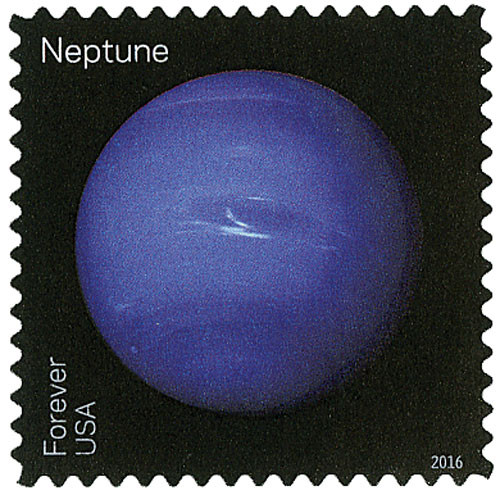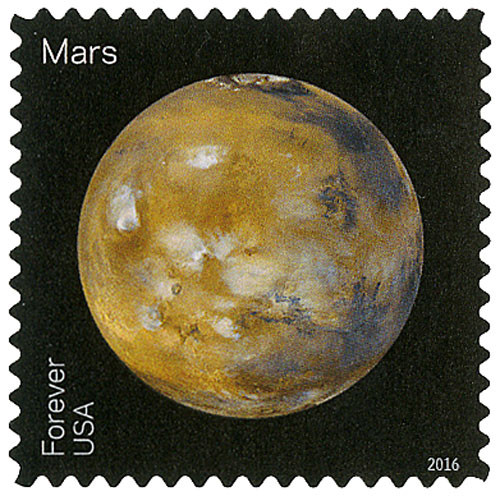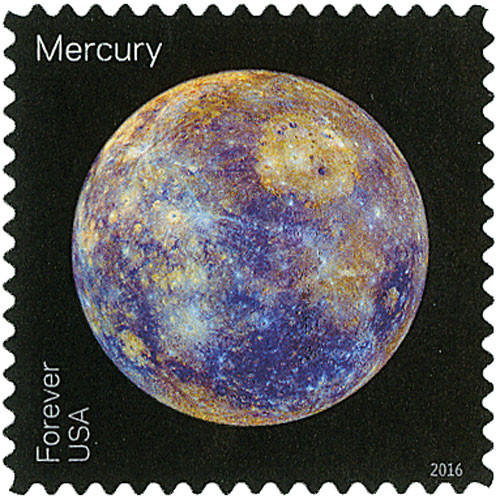
# 5075 - 2016 First-Class Forever Stamp - Views of Our Planets: Uranus
US #5075
2016 Uranus – Views of Our Planets
- Pictures Uranus, the seventh planet from the Sun
- One of 8 stamps issued alongside the 2016 Pluto Explored stamps to commemorate space exploration in our Solar System and New Horizon spacecraft’s flyby of Pluton in 2015
Stamp Category: Commemorative
Set: Views of Our Planets
Value: 47¢ First Class Mail Rate (Forever)
First Day of Issue: May 31, 2016
First Day City: New York, New York
Quantity Issued: 40,000,000
Printed by: Ashton Potter (USA) Ltd.
Printing Method: Offset
Format: Panes of 16
Tagging: Nonphosphored type III, spot tag
Why the stamp was issued: To showcase Uranus, the seventh planet from the Sun, and the NASA efforts that have allowed us to see this planet up-close. To honor NASA’s space exploration efforts within our Solar System that have given us up-close images of every plant and – as of 2015 – dwarf planet Pluto.
About the stamp designs: Pictures an image of Uranus from NASA, the European Space Agency, and E. Karkoschka (Arizona Board of Regents, University of Arizona).
First Day City: The First Day of Issue Ceremony was held at the Javits Center in New York City during the World Stamp Show 2016.
About the Views of Our Planets set: Eight stamps issued to honor NASA’s space exploration efforts within our Solar System that have given us up-close images of every planet and – as of 2015 – dwarf planet Pluto. Each stamp pictures one planet in our Solar System. According to the USPS, “Some show the planet’s ‘true’ color – what we might see with our own eyes if traveling through space. Others use colors to represent and visualize certain features of a planet based on imaging data. Still others use the near-infrared spectrum to show things that cannot be seen by the human eye in visible light.”
History the stamp represents: Though most planets were discovered thousands of years ago, Uranus wasn’t found until 1781, by Sir William Herschel of England.
Debate raged for nearly 70 years over the new planet’s name. Herschel wanted to name it after the King of England, but few outside that country liked the idea. Then it was proposed and later accepted that the new planet be named Uranus, after the Greek god of the sky and father of Saturn, the next closest planet.
Uranus’s rotational axis is tilted so that it appears to be rotating on its side. Scientists believe this happened after a collision with a planet-sized body early in its development. Because of its long 80-year orbit, Uranus has 20-year seasons that expose it to extreme variations of sunlight and darkness.
At -371 degrees Fahrenheit, Uranus has the coldest atmosphere in the solar system. This atmosphere is composed of hydrogen, helium, water, ammonia, and methane (which gives it its blue-green color). As an “ice giant,” about 80 percent of Uranus is made of ice.
Located 1.7 billion miles from Earth, Uranus has been difficult to explore, though astronomers and probes have found it has 11 rings and at least 27 moons. Missions to Uranus have been discussed but not yet approved. Until then, we rely on our telescopes to help us discover more about this frozen planet.
US #5075
2016 Uranus – Views of Our Planets
- Pictures Uranus, the seventh planet from the Sun
- One of 8 stamps issued alongside the 2016 Pluto Explored stamps to commemorate space exploration in our Solar System and New Horizon spacecraft’s flyby of Pluton in 2015
Stamp Category: Commemorative
Set: Views of Our Planets
Value: 47¢ First Class Mail Rate (Forever)
First Day of Issue: May 31, 2016
First Day City: New York, New York
Quantity Issued: 40,000,000
Printed by: Ashton Potter (USA) Ltd.
Printing Method: Offset
Format: Panes of 16
Tagging: Nonphosphored type III, spot tag
Why the stamp was issued: To showcase Uranus, the seventh planet from the Sun, and the NASA efforts that have allowed us to see this planet up-close. To honor NASA’s space exploration efforts within our Solar System that have given us up-close images of every plant and – as of 2015 – dwarf planet Pluto.
About the stamp designs: Pictures an image of Uranus from NASA, the European Space Agency, and E. Karkoschka (Arizona Board of Regents, University of Arizona).
First Day City: The First Day of Issue Ceremony was held at the Javits Center in New York City during the World Stamp Show 2016.
About the Views of Our Planets set: Eight stamps issued to honor NASA’s space exploration efforts within our Solar System that have given us up-close images of every planet and – as of 2015 – dwarf planet Pluto. Each stamp pictures one planet in our Solar System. According to the USPS, “Some show the planet’s ‘true’ color – what we might see with our own eyes if traveling through space. Others use colors to represent and visualize certain features of a planet based on imaging data. Still others use the near-infrared spectrum to show things that cannot be seen by the human eye in visible light.”
History the stamp represents: Though most planets were discovered thousands of years ago, Uranus wasn’t found until 1781, by Sir William Herschel of England.
Debate raged for nearly 70 years over the new planet’s name. Herschel wanted to name it after the King of England, but few outside that country liked the idea. Then it was proposed and later accepted that the new planet be named Uranus, after the Greek god of the sky and father of Saturn, the next closest planet.
Uranus’s rotational axis is tilted so that it appears to be rotating on its side. Scientists believe this happened after a collision with a planet-sized body early in its development. Because of its long 80-year orbit, Uranus has 20-year seasons that expose it to extreme variations of sunlight and darkness.
At -371 degrees Fahrenheit, Uranus has the coldest atmosphere in the solar system. This atmosphere is composed of hydrogen, helium, water, ammonia, and methane (which gives it its blue-green color). As an “ice giant,” about 80 percent of Uranus is made of ice.
Located 1.7 billion miles from Earth, Uranus has been difficult to explore, though astronomers and probes have found it has 11 rings and at least 27 moons. Missions to Uranus have been discussed but not yet approved. Until then, we rely on our telescopes to help us discover more about this frozen planet.







